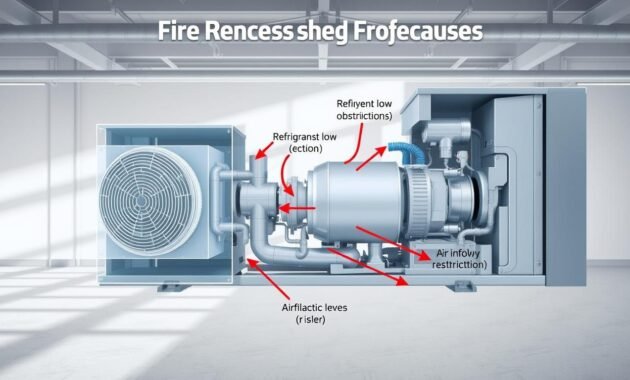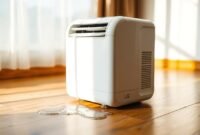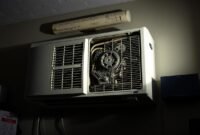Are you worried about your air conditioner freezing up during hot summer days? Many homeowners face the problem of an air conditioner freezing over. This can lead to expensive repairs and make your home too hot.
Running your AC without care can turn a cool home into a maintenance problem. I’ll show you how long your AC can run before freezing. I’ll also share important tips to keep your cooling system working well.
By knowing the signs and taking preventive steps, you can avoid AC breakdowns. Let’s explore how to prevent air conditioner freezing and keep your home cool.

Understanding Your AC System’s Basic Operation
Central air conditioning keeps your home cool in summer. Knowing how it works helps you keep it running well. This prevents problems like freezing.
Your AC system removes heat and humidity. The size of your home affects how well it works, more so in humid weather.
The Role of Refrigerant in Cooling
Refrigerant is key to cooling. It moves through your AC, taking heat from inside and moving it outside. Here’s how it works:
- Absorbs heat from indoor air
- Transforms from liquid to gas during the cooling process
- Releases heat outside the home
Key Components and Their Functions
Every AC system has important parts that cool your home:
- Compressor: Pressurizes and moves refrigerant
- Evaporator Coil: Absorbs indoor heat
- Condenser: Releases heat outside
- Expansion Valve: Regulates refrigerant flow
The Heat Transfer Process
The heat transfer process is interesting. Warm air meets cold coils, losing heat. The refrigerant takes this heat outside, leaving cool air inside.
Knowing these basics helps you keep your AC running right. It also stops freezing problems.
Read also: Why Air Conditioner Keeps Running When Turned Off?
Common Signs Your AC is Starting to Freeze

Spotting early signs of a frozen evaporator coil can save you money and keep your home cool. As an HVAC expert, I’ve seen many homeowners deal with ice buildup. This could have been avoided with early detection.
To prevent AC freezing, it’s important to know the warning signs. Here are the key indicators to watch for:
- Reduced airflow from vents
- Unusual frost or ice formation on refrigerant lines
- Condensation or water pooling around the indoor unit
- Weak or inconsistent cooling performance
- Strange humming or buzzing sounds from the AC unit
One clear sign of a problem is when your AC blows warm air instead of cool. This usually means the evaporator coil is frozen. The ice blocks airflow and stops the system from cooling right.
Temperature and humidity affect your AC’s performance. High indoor humidity and cooler temperatures make freezing more likely. Regular maintenance and quick action to these signs can prevent expensive fixes and keep your AC running longer.
How Long Can AC Run Before Freezing
Knowing your air conditioning’s limits is key to keeping it running well. Running it too long can stress it out and cause it to freeze up. This is something you want to avoid.
Your AC has certain limits that affect its health and how well it works. Running it all the time isn’t always bad. But, some things can make it wear out faster.
Factors Affecting Running Time
- Ambient temperature and humidity levels
- System age and maintenance history
- Quality of initial installation
- Refrigerant charge and system pressure
Optimal Running Periods
Most AC systems can run for 8-10 hours without major problems. But, many things can change how well it works.
| System Type | Recommended Continuous Run Time | Potential Risk Factors |
|---|---|---|
| Central Air Conditioning | 8-10 hours | Low airflow, dirty filters |
| Window Units | 6-8 hours | Limited cooling capacity |
| Ductless Mini-Split | 10-12 hours | Maintenance of outdoor unit |
Warning Signs of Extended Operation
- Ice formation on refrigerant lines
- Reduced cooling efficiency
- Unusual grinding or squealing noises
- Increased energy consumption
It’s smart to get regular maintenance to avoid problems. A pro can check for signs of stress and prevent big issues.
Primary Causes of AC Freezing Issues

Knowing why your air conditioning freezes is key to avoiding expensive fixes. A dirty air filter is often the main reason for AC freezing. When air can’t flow well, your cooling system’s balance is upset.
Several key factors contribute to AC freezing issues:
- Insufficient airflow from dirty air filters
- Low refrigerant levels
- Blocked or damaged air vents
- Malfunctioning blower fans
- Faulty thermostat settings
Regular AC maintenance is vital to stop freezing. Dirt and debris can quickly turn a good system into a freeze risk. The lack of airflow makes evaporator coils freeze, stopping cooling.
Read also: What Causes an Air Conditioner to Freeze Up?
| Cause | Potential Impact | Prevention Method |
|---|---|---|
| Clogged Air Filter | Restricted Airflow | Monthly Filter Replacement |
| Low Refrigerant | Coil Temperature Drop | Professional System Check |
| Blocked Vents | Uneven Cooling | Regular Vent Cleaning |
By spotting these issues early, you can keep your AC running smoothly. This prevents sudden freezing problems.
The Impact of Poor Airflow on System Performance
Your air conditioning system needs smooth airflow to work well. When airflow is blocked, it can cause big problems like air conditioner frost and ac freezing up. Knowing about these issues helps keep your cooling system running smoothly.
Airflow is key for your air conditioning system. If it’s restricted, it can lead to big performance problems. These problems can even damage your system.
Blocked Air Filters
Dirty air filters are a big problem for your AC. When they get clogged, they:
- Reduce air circulation
- Increase system strain
- Prevent proper heat exchange
- Make air conditioner frost more likely
Dirty Coils
Dust and debris on evaporator coils mess up cooling. They stop the system from absorbing heat well. This can cause ac freezing up and lower system efficiency.
Duct System Problems
Bad ductwork causes big airflow issues. Leaks, blockages, and poor design stop cool air from spreading right. This makes system freezing more likely.
Regular maintenance and professional checks can stop these airflow problems. They keep your air conditioning system working well.
Preventing AC Freeze-ups Through Maintenance
Keeping your air conditioning system running smoothly is key. AC maintenance to prevent freezing is not just about saving money. It’s about keeping you cool during hot summer months. I’ll share important steps to prevent AC from freezing and keep your system in great shape.
Regular maintenance can greatly lower the chance of unexpected breakdowns. Here are key strategies to protect your AC system:
- Change air filters every 1-3 months
- Clean outdoor unit from debris and vegetation
- Check refrigerant levels annually
- Inspect and clean evaporator and condenser coils
- Ensure proper airflow around the unit
Professional inspections are vital in preventing AC freezing. I suggest getting a thorough system check at least once a year. Trained technicians can spot issues before they cost a lot. They’ll check electrical connections, lubricate parts, and check the system’s performance.
DIY maintenance is good, but some tasks need a pro. Look out for signs like reduced cooling, unusual noises, or ice on refrigerant lines. These signs mean you need to fix issues fast to avoid freezing.
By spending a bit of time and effort on AC maintenance, you’ll make your system last longer. And you’ll have reliable cooling when you need it most.
The Role of Proper Sizing in AC Performance
Choosing the right size for your home’s central air conditioning system is key. It ensures optimal performance and energy efficiency. An AC unit that’s too small can cause many problems, affecting your comfort and raising energy costs.
When picking a central air conditioning system, many homeowners forget about matching the unit’s size to their home. The AC’s size affects its cooling power and ability to keep temperatures steady.
Understanding BTU Requirements
BTU (British Thermal Unit) ratings help find the right air conditioning size for your home. Consider these factors:
- Square footage of your living space
- Ceiling height
- Home insulation quality
- Number of windows and their sun exposure
- Local climate conditions
Signs of an Undersized System
Knowing when your central air conditioning system is too small can prevent ongoing issues. Look out for these signs:
- Rooms that never reach the desired temperature
- Constant running of the AC unit
- Significantly higher energy bills
- Uneven cooling throughout your home
- Excessive humidity indoors
I suggest talking to a professional HVAC technician for a precise load calculation. They can help you choose a central air conditioning system that offers maximum comfort and energy efficiency.
Emergency Steps When Your AC Freezes
Discovering a frozen evaporator coil can be stressful. But knowing the right steps can help protect your air conditioning system. Quick and careful action is key when ac freezing up occurs.
The first and most important step is to immediately turn off your air conditioning system’s cooling mode. Switch the fan to the “on” position. This helps circulate warm air and starts melting the ice. It prevents additional strain on your system and begins the defrosting process.
- Shut off the cooling function completely
- Set the fan to “on” position
- Allow sufficient time for ice to melt naturally
- Check air filters for possible blockages
While waiting for the frozen evaporator coil to thaw, inspect your system for possible causes. Check air filters for dirt and debris. These can restrict airflow and cause ac freezing up. Make sure vents are open and unobstructed to promote proper air circulation.
Read also: How To Tell if AC is Frozen? Learn the Signs
If the freezing persists or you notice recurring issues, it’s time to contact a professional HVAC technician. They can diagnose underlying problems like low refrigerant levels, faulty components, or inadequate system maintenance. These might be causing your AC to freeze.
Remember, patience is key during the thawing process. Avoid using sharp objects to remove ice, as this can damage delicate system components. Once the ice has completely melted, you can restart your air conditioning system and monitor its performance.
Conclusion
Knowing how long an AC can run before freezing is key to keeping it working well. I’ve found that regular maintenance is the best way to avoid freezing issues. This keeps your home cool and your AC running smoothly.
Regular checks and being aware of your AC’s performance are your best defenses. By watching how it works, changing filters, and getting professional checks, you can avoid big problems. Knowing when your AC might freeze helps you fix issues early.
Stay alert to your AC’s needs. Look out for signs like less airflow, strange noises, or ice on the unit. A bit of care now can save you from expensive fixes later. This way, your AC will keep you cool when it’s hottest.
A well-kept AC works better and lasts longer. By following the tips we’ve shared, you’ll avoid freezing and keep your AC in top shape all year.


